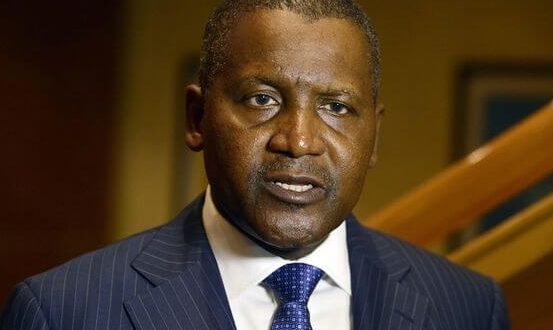
The Founder and President/Chief Executive of the Dangote Group, Aliko Dangote has called on the Nigerian Customs and border services to step up their efforts in the check of illegal imports and under declaration of duties and levies so as to ensure the success of the backward integration policy of the Nigerian economy.
Dangote stated this on Wednesday while delivering the 3rd Eminent Persons Business Lecture of the University of Ibadan School of Business (UISB) titled “Industrialization – Backward Integration as a strategy for National Development: The Story of the Dangote Group”.
The event also witness the official commissioning of a N300 million ultra-modern building named Aliko Dangote Complex, donated to the UISB by the business mogul.
The business mongul who observed that the state governments need to be more efficient at facilitating land acquisition for large-scale developments said that policy focus and choice of the sector are also critical to the success of backward integration and import substitution/ local content policies.
Dangote, who was represented by the Group Executive Director, Dangote Group, Engineer Ahmed Mansur, maintained that, in an increasingly globalised world, one could not ignore the increasing impacts of international trade dynamics on domestic markets and livelihoods and as such, if Nigerian businesses are to stand a chance, it would need to evolve to be competitive and not just survive.
Defining the concept, Dangote said “backwards Integration implies a business exerting control over sources of raw materials or other business that are part of its overall manufacturing process. For example, a cement trader becomes backwards integrated when he takes ownership or control of bagging, cement grinding, limestone mining, etc.”
Using the experience of the company in the Nigerian rice, sugar and cement industry as examples, the guest lecturer pointed out that, “backward Integration leads to job creation; both direct and indirect, and skilled and unskilled. It has contributed to the diversification of the economy by stimulating the growth of the non-oil sector, reduced the demand for foreign exchange, and created new sources of foreign exchange from exports.
“Backward integration in agriculture also improves food security through assured availability and quality (rice and sugar scarcity will be significantly eliminated), while securing steady incomes for farmers and increasing technology transfer, innovation, and productivity. In cement, the growth in local capacity from 3 million metric tons in 2002 to ~44 million metric tons translates to a CAPEX of about US$ 8 billion (a massive boost for the non-oil sector of the economy). This has also displaced FX-demand for cement imports which would by now have grown to US$1.5 to 2.0 billion annually”.
Earlier, the institution’s Vice Chancellor, Professor Idowu Olayinka recounted that the UISB has recorded many important accomplishments since inception.
According to him, “most importantly, the UI brand has rubbed off positively on the school making it very attractive to quality students, lecturers, industry players, corporate Nigerian as well as international and local partners”.
Director, UISB, Prof Adenike Osofisan in her remarks said the Eminent Persons Business Lecture, EPBL has been designed in form of a series of high profile, special framework towards achieving the above niches.
She said, “It is to serve as a forum for regular harvesting, exchanging and appraising policy initiatives conducive to the evolution of a private sector-led Nigerian economy, and fostering the desired partnership for the required inclusive growth process”.
